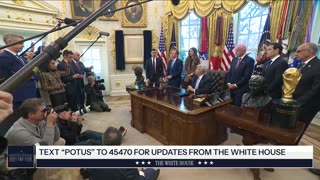Premium Only Content

How Did We Get To An Administrative State?
YouTube = https://www.youtube.com/channel/UCGobVm8zABdoMmv8Fbc1wMg
Rumble = https://rumble.com/user/SweetHomeStAugustine
Locals = https://sweethomesa.locals.com/
POPULIST REVOLT = https://populistrevolt.com
As the Biden administration reels from a string of recent legal defeats, political analysts hail the U.S. Supreme Court’s latest ruling, West Virginia v. EPA, as but one component of a new, broad-based approach that the courts are taking to halt a century-long effort by progressives to empower the administrative state and rule Americans by bureaucratic decree.
Dating back to President Woodrow Wilson 100 years ago, progressive presidents, including Franklin Roosevelt, Lyndon Johnson, Barack Obama, and Joe Biden, have worked to transfer law-making authority from Congress to their executive agencies. Wilson, the father of modern-day progressives, believed the Constitution, with its separation of powers, was an outdated document and that professional bureaucrats were superior at decision-making, compared to the time-consuming and compromise-ridden process of passing laws through elected representatives.
Wilson wrote in the 1887 article “The Study of Administration” that “the many, the people, who are sovereign [under the Constitution] have no single ear which one can approach, and are selfish, ignorant, timid, stubborn or foolish.”
“The greatest revolution since the Constitution in many ways has been this movement away from legislatures into agencies,” Matthew Spalding, Dean of Hillsdale College’s Graduate School of Government, told The Epoch Times. “The crisis here is the movement away from consent,” as Americans increasingly lose their right to have a voice in setting the laws and regulations that control their lives.
In 1984, for example, the Supreme Court handed down a decision that came to be known as the Chevron Doctrine, ruling that federal agencies had the authority to decide the scope of their power in situations where congressional authorization was ambiguous. Since this ruling, Chevron v. National Resources Defense Council, the courts have sided with federal agencies in cases where the authority of agencies was challenged.
Now, for the first time in a century, a series of rulings from federal courts have put up a roadblock to halt administrative encroachment. Two factors have brought about this change. First, the appointment by the Trump administration of 234 federal judges, including three Supreme Court justices. And second, the Biden administration’s unusually brazen attempts to push federal agencies well beyond their legal authority in order to impose a left-wing agenda on the United States without popular consent.
In the case of West Virginia v. EPA, the Environmental Protection Agency (EPA) attempted to force America’s electric utilities to switch from fossil fuels to wind and solar. On June 30, the Supreme Court ruled that the Biden administration had no authority to do so.
“For years, unelected bureaucrats in the administrative state have been trying to destroy our fossil fuel industries by transforming the EPA into a communist-style central planning authority because they know they can’t get their radical environmental policies passed through Congress,” said West Virginia State Treasurer Riley Moore, lauding the decision as “a victory for the rule of law.”
“Part of the problem is Congress writing these broad laws that leave a lot of room for interpretation by the agencies that are supposed to execute the laws,” William Shughart, told the Epoch Times.
One of the key components of this Supreme Court ruling is the “major questions doctrine.” This is the concept that agencies, which are unelected by and unaccountable to the public, cannot make up rules on issues of major importance to Americans without clear authorization from elected representatives.
“The Supreme Court decision speaks to the legal flaws with trying to mark an entire industry for termination,” Jonathan Berry, a partner at Boyden Gray & Associates, told The Epoch Times. “What the Supreme Court is saying is that when you take on initiatives of major economic or political significance, those measures have to be authorized by a clear statement from Congress.”
“There are already tons of lawsuits out there that have been winding their way through the legal system for years,” Bonner Cohen, senior fellow at the National Center for Public Policy Research, told The Epoch Times. “Some of those lawsuits will eventually make it to the Supreme Court, but a lot of them may be dealt with at lower court level simply because people can now point to the precedent that was set in West Virginia v. EPA.”
Administrative Overreach
Loss of Public Trust
Granting Power to Experts
-
 LIVE
LIVE
vivafrei
2 hours agoLive with Chris Martenson - Discussing Charlie Kirk Assassin Conspiracy Theories
1,116 watching -
 LIVE
LIVE
The Quartering
2 hours agoFBI Caught Covering Up For Trump Assassin, Trump Orders Epstein File Release, Babylon Bee Backlash
7,203 watching -
 1:56:02
1:56:02
Tucker Carlson
2 hours agoBig Pharma’s Most Dangerous Lie and the Dark Truth About Weed
9.14K102 -
 LIVE
LIVE
The White House
4 hours agoPresident Trump Meets with the White House Task Force on the FIFA World Cup 2026
673 watching -
 LIVE
LIVE
TheSaltyCracker
1 hour agoSALTcast 11-17-25
3,135 watching -
 1:17:45
1:17:45
DeVory Darkins
2 hours agoTrump drops STUNNING update as Chicago gets exposed for fraud
96.3K27 -
 LIVE
LIVE
Dr Disrespect
4 hours ago🔴LIVE - DR DISRESPECT - ARC RAIDERS - STELLA MONTIS QUESTS
2,559 watching -
 LIVE
LIVE
Jeff Ahern
42 minutes agoMonday Madness with Jeff Ahern
101 watching -
 1:21:49
1:21:49
Sean Unpaved
3 hours agoJa'Marr Chase LIED About Spitting On Jalen Ramsey! | UNPAVED
14.8K1 -
 2:17:54
2:17:54
Side Scrollers Podcast
4 hours agoAsmongold vs DSP + Metroid Prime 4 CONTROVERSY + Disney DROPS DEI? + More | Side Scrollers
24.6K3